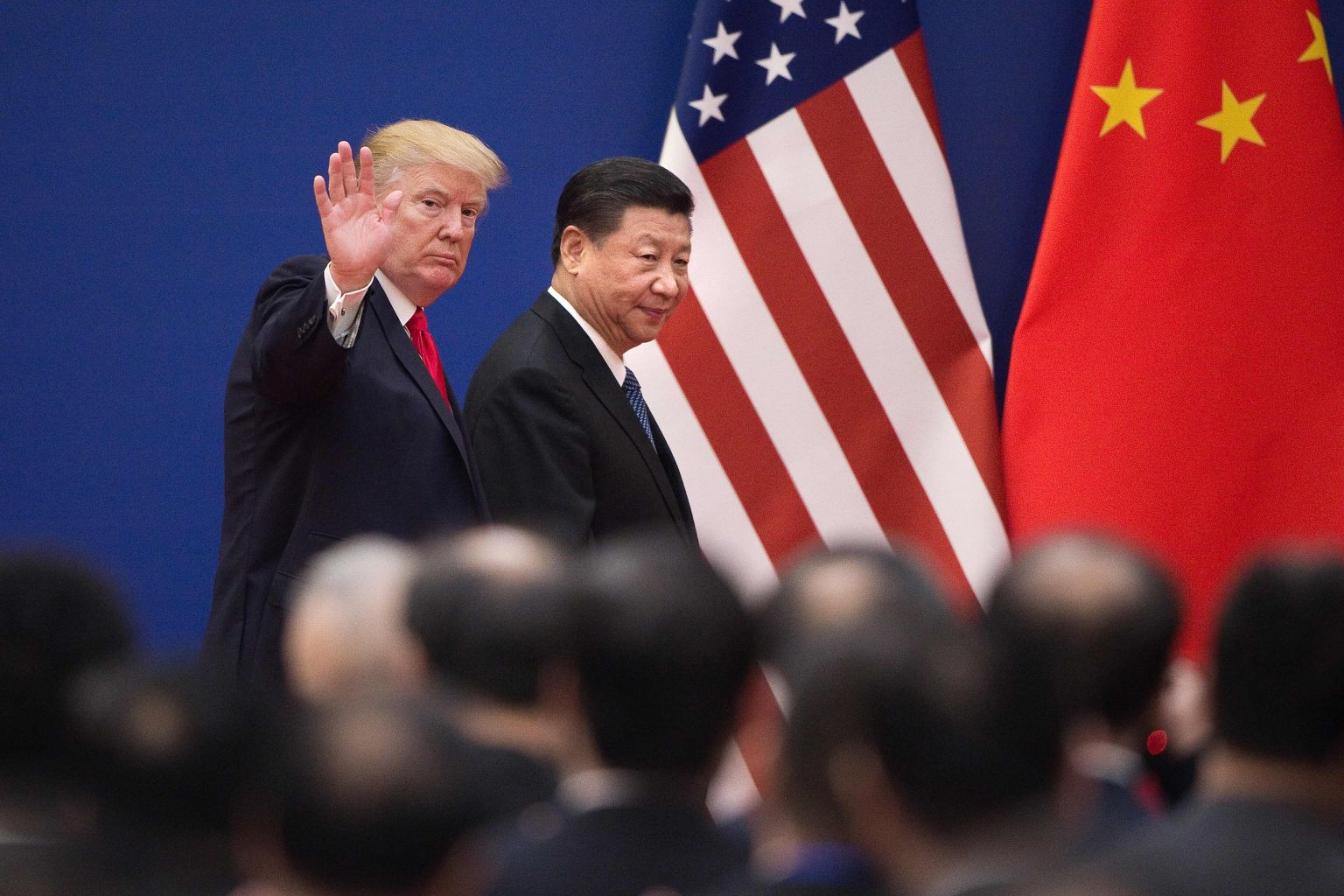China urges US to work together for a 'beautiful future' following Trump's State of the Union address
Sign up now: Get insights on Asia's fast-moving developments

US President Donald Trump and Chinese President Xi Jinping greeting the crowd at the Great Hall of the People in Beijing on Nov 9, 2017.
PHOTO: AFP
BEIJING - China responded to United States President Donald Trump's characterisation of the Asian power as a rival that challenges American values by urging both sides to manage differences and work towards a "beautiful future".
"China and the United States share broad and important common interests while, at the same time, there exist some differences," Foreign Ministry spokesman Hua Chunying said at a regular press briefing on Wednesday (Jan 31).
Ms Hua was responding to a question regarding Mr Trump's State of the Union address in Congress in which he called China and Russia rivals that "challenge our interests, our economy, and our values".
She noted that the two countries' common interests "far outweigh" their differences.
She added she hoped that the US would abandon its outdated Cold War thinking and work with China to focus on cooperation, manage differences and safeguard the "sound and steady development" of China-US relations.
"Both history and reality have shown that cooperation is the only correct choice for both China and the United States," she said.
On Mr Trump's call to rebuild America's nuclear arsenal as part of a strengthening of the country's defence, she said the US as the largest nuclear-armed nation "has a special and prior responsibility towards nuclear disarmament".
While Ms Hua's remarks were conciliatory, the Chinese media was less so.
The Global Times, a nationalistic tabloid, called Mr Trump in a scathing editorial "a bit of a bragger", adding that American political circles liked such braggers.
It tore into his plan to spend more on defence, warning of the negative impact this would have on the international order.
It criticised Washington's protectionist trade policy and withdrawal from the Paris climate pact, saying these were selfish moves.
It warned that the accumulation of dissatisfaction in the international community towards the US could potentially erode and threaten the sustainability of the US' prosperity.
The People's Daily commented on Mr Trump's call for fair and reciprocal trade relationships, saying the White House should "rethink its trade policies rather than blame the trade deficit and job loss on other countries".
However, given the widening trade deficit that the US has with China, Mr Trump would be under pressure to take further policy measures to narrow that gap, said Mr Rajiv Biswas, Asia-Pacific chief economist of IHS Markit.
This would be worrisome for Hong Kong. If hefty tariffs were to be imposed on Chinese products such as electronics and light industrial goods, it could have some impact on Hong Kong's re-exports from China, said Mr Vincent Chan of Credit Suisse.
International relations expert Su Hao said Mr Trump's naming of China and Russia as rivals stemmed from the US leader's need to find an outside enemy to unite his country and silence his critics. But "this is irresponsible", said Professor Su of the China Foreign Affairs University.
Mr Trump's harsh remarks on North Korea were noticed, particularly by North-east Asian countries.
In particular, his remarks that the North's nuclear weapons could "very soon" threaten the US mainland and his tribute to a North Korean defector hogged headlines in South Korea.
Analysts warned, however, that Mr Trump's hardline stance may differ from the South Korean government's hope for reconciliation and broader talks about nuclear disarmament.
Dr Cha Du Hyeogn, a visiting research fellow at the Asan Institute for Policy Studies, told The Korea Herald newspaper that based on Mr Trump's remarks, "denuclearisation talks will be difficult and should not be hoped for".
In Japan, the mood was less pessimistic. Foreign Ministry spokesman Natsuko Sakata told The Straits Times that Japan "highly appreciates" the strong messages that Mr Trump sent, on the need to keep up pressure on North Korea to get it to give up its nuclear weapons.
"In order to have North Korea change its policy, Japan will continue to collaborate bilaterally with US, trilaterally with US and South Korea, and closely work with China, Russia and other relevant countries in maximising pressure on North Korea," she said.
In India, it was not North Korea but Mr Trump's comments on immigration that made the headlines.
The Times of India newspaper noted in an article that a merit-based immigration system "could benefit highly skilled Indian workers".
But it called Mr Trump's remarks "good news and bad news" as the President spoke about stopping chain migration or the immigration of members of the extended family.
"Overall it's good for Indians primarily because most people who go from India are white-collar workers, typically software programers or scientists,'' said Mr Kris Lakshmikanth, head of an executive search firm.
Elsewhere in Asia, the response was muted, with media outlets carrying wire stories of Mr Trump's speech.
In Muslim-majority Malaysia, the focus was on Mr Trump's insistence that the war on the Islamic State in Iraq and Syria (ISIS) needs more work, and that Guantanamo Bay, known as a detention centre for high-profile Muslim militants, would continue to operate.
Australian media did carry prominent coverage of the speech, noting that it was fiercely nationalistic but less provocative or combative than Mr Trump's standard political rhetoric.
Commentators also said that the speech continued Mr Trump's penchant for bending the truth, or disregarding it altogether, particularly when it came to trumpeting the nation's growing economy.
"Some of his boasts were exaggerated or questionable," noted US watcher John Barron on ABC's website.
Additional reporting by Claire Huang in Singapore, Chang May Choon in Seoul, Walter Sim in Tokyo, Nirmala Ganapathy in New Delhi, Shannon Teoh in Kuala Lumpur and Jonathan Pearlman in Sydney


